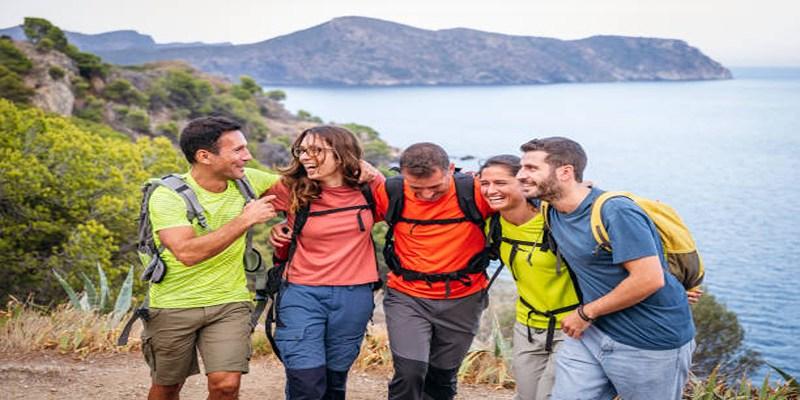The majority of the travelers are very meticulous. However, it could be really transformative experience to abandon such plans. Traveling on the spur of the moment — spontaneous or unplanned — means little planning, and curiosity guides the choice. Although this may seem profligate, it will have its own advantages. It is not a matter of not preparing, but being ready for possibilities. The acceptance of the unknown provides room in our experience for authentic experiences, personal development, and surprises that none of our guidebooks will assist with.

Traditional travel follows a formula: destination research, booking accommodations, creating itineraries, and following predetermined routes. Unplanned travel flips this approach entirely.
Taking a one-way flight to an unfamiliar country is something that spontaneous travelers can do as opposed to following a strict schedule. Instead of booking hotels, they should settle for accommodations that are recommended locally or choose what they feel like at the time. It is the road, rather than the destination, that is important.
This does not constitute being affected on a blind basis. Savvy business travelers are capable of handling basics such as visa administration, travel insurance, and basic equipment. It all hinges on the fact that it is open to serendipity to affect the experience.
Unplanned travel transforms you into a creative problem-solver. You find a strangely exotic place in a back street when your well-thought-out restaurant has been shut down. Your planned place to stay goes awry, and you end up living with a local family with whom you become close friends for the rest of your life.
These curveballs make your brain work differently. You are more enterprising and learn how to adapt to rapidly changing situations. Such mindfulness is far more extensive than traveling and can help you become better at managing the uncertainty that encompasses every aspect of your life.
The decision-making muscles are exercised by the necessity of constantly making decisions on the spot, such as where to eat, where to sleep, and which direction to look in. You learn to trust your instincts and become accustomed to ambiguity.
The construction of tours and preset activities often creates a point of separation between tourists and indigenous cultures. In cases where you adhere to a strict schedule, you will be in touch with others and the surrounding world less frequently.
These obstacles are broken down by spontaneous travel. You are free of list checking and are free to experience people truly. You could talk to strangers at the bus stop, end up at family dinners, or even Luck upon these cultural parties that haven't been listed in the tourist literature.
And these spontaneous episodes usually turn out to be the best in every tour. All the things you can do when you have time and space in your mind to be present are the elderly fisherman teaching you on the proper way to catch fish, the street musician who includes you in playing a jam, or the market seller who makes some of their family recipes with you.
Spontaneous travel usually makes people less stressed, even when it is unplanned. Once you take a load off your shoulders and view everything without an agenda or goal to achieve during your trip, you will be able to see and enjoy whatever happens to occur naturally.
It is a practice that promotes mindfulness. You may not have to visit and leave various attractions in a short time; you can spend a whole afternoon at one of the parks, doing people watching or sightseeing in the neighbourhood that has attracted your attention. The environment makes you more observant because you probably do not pay much attention to details when buying items, such as a pen to cross them off in a to-do list.
The lack of fixed time schedules also eliminates the fear of arriving late or missing scheduled activities. You also know how to cope with the stream of things, how to adjust to them, and not to resist.
Contrary to the prevailing perception, however, spontaneous travel is often less expensive than travel planned well in advance. When you are without heavy commitments to make in place of the exorbitant prior arrangements, consider last-minute bargains. Your locals will advise you on budget-friendly spots and revel in the backtracking that you will encounter, with no indication of a vacation rate.
You can find that you will spend half of what you would have spent in a hotel you had in mind, or you can see that the food offered by the street sellers is the best you can get compared to what the suggested restaurants are doing. This will make you flexible enough to budget what you have with you, allowing you to prioritize processing tasks at any given time.
Furthermore, spontaneous travelers often discover free or low-cost activities that default travelers are unaware of. There are numerous occasions, such as local festivals, impromptu concerts, community events, and simply time in nature, which are inexpensive and richly captured.
One of the best aspects of unplanned travel is that it changes people. Losing routines and relying on oneself to get through the situations you have never encountered, you learn that you have these abilities.
When a trip with other passengers becomes the main activity, you even think that you are not as antisocial as you believed before. Or you would discover a passion for embarking on an adventure this time, when you start using hiking as your method of transportation. Such discoveries about yourself tend to be everlasting, even outside of what you have been through on your journey.
This coat of clothes creates more confidence when one manages to sail the seas without knowing what will happen next. You are less afraid of uncertain things; you take more calculated risks and allow yourself to trust that you can cope with anything.

Unplanned travel serves as a masterclass in resilience. When flights get cancelled, accommodation falls through, or weather derails your loose plans, you learn to bounce back quickly and find alternative solutions.
This resilience builds over time. What initially feels overwhelming gradually becomes manageable, then even exciting. You develop a toolkit of coping strategies and learn to view obstacles as opportunities for growth rather than problems.
The adaptability gained through spontaneous travel proves invaluable in an increasingly unpredictable world. Whether dealing with career changes, relationship challenges, or global disruptions, the mental agility developed through unplanned adventures helps you navigate life's uncertainties with greater ease.
Embrace unplanned travel by starting with weekend trips to nearby destinations. Research basic safety and visa requirements, but leave room for discovery. Pack light, bring a map, download offline language apps, and ensure your phone is compatible with international use. Stay in hostels or homestays that provide you with opportunities to form connections with locals and others, such as those who sail on the same route. Accentuate the points in writing. Guests and friends can have the most exciting adventures when they are least expected- accept them!
 TOP
TOP
Curious about when to claim your Social Security benefit? Learn how age, health, income, and other personal factors influence this important decision and shape your retirement future
 TOP
TOP
The joys of spontaneous travel with tips for unplanned adventures, packing light, and connecting with locals for unforgettable experiences.
 TOP
TOP
Discover thrilling day trips near Cape Town, featuring stunning landscapes, cultural experiences, and adventure for every traveler.
 TOP
TOP
Discover the truths and misconceptions about medical research studies in this insightful article.
 TOP
TOP
The benefits of outdoor activities for improving physical and mental well-being.
 TOP
TOP
Discover the truth about cold weather and its link to sickness in this science-based article.
 TOP
TOP
Identify emotional clutter and discover practical ways to declutter your mind for clarity and peace.
 TOP
TOP
Debunking 7 common myths about Alzheimer’s and dementia for clearer understanding.
 TOP
TOP
Untreated GERD can cause esophagus damage, Barrett’s esophagus, dental erosion, and cancer. Learn symptoms, risks, and why early treatment matters for health.
 TOP
TOP
Aphantasia affects mental imagery, memory, and creativity. Explore its causes, cognitive impacts, coping strategies, and real-life adaptations for navigating life without a mind's eye.
 TOP
TOP
Mental health shapes our well-being, productivity, and equality. Learn why it matters for everyone and discover ways to build stronger support systems.
 TOP
TOP
Learn to identify whether your eyelid bump is a stye or a chalazion, understand the causes and symptoms, and explore effective treatment options for better eye health and comfort.